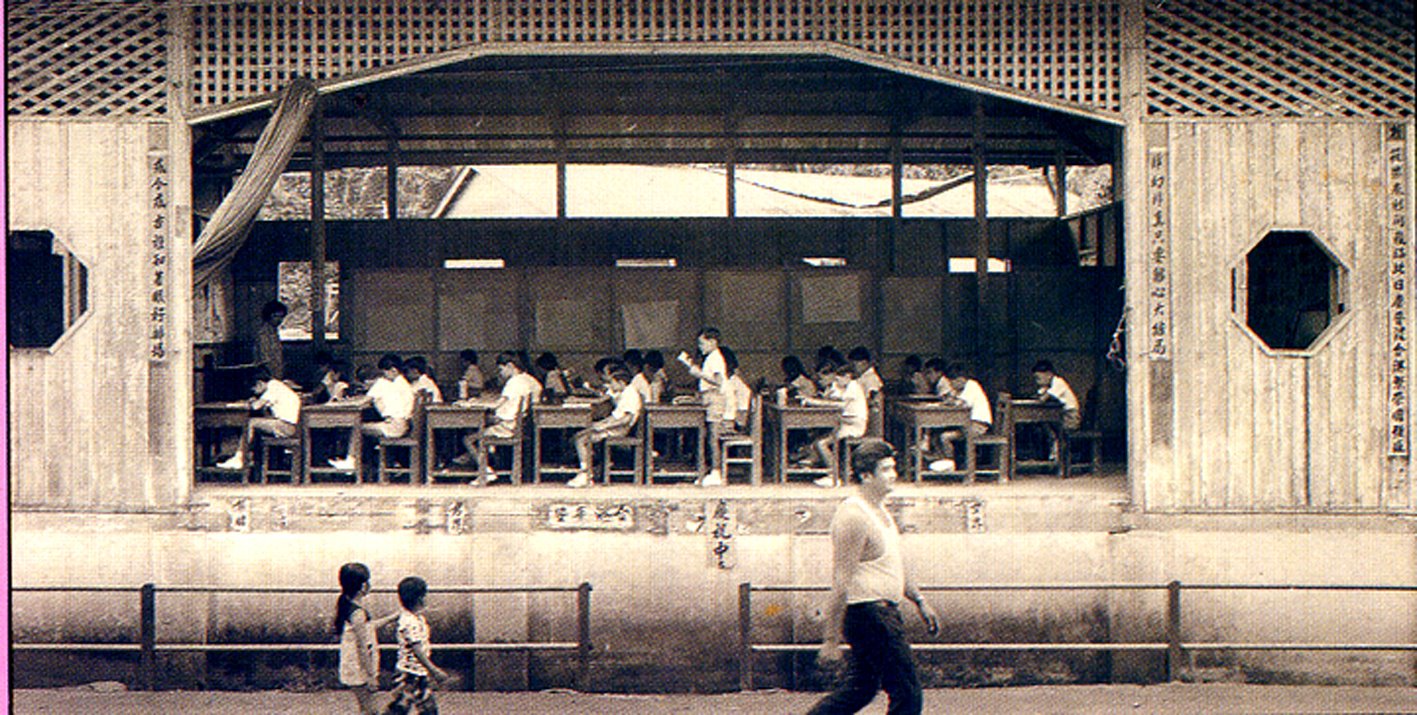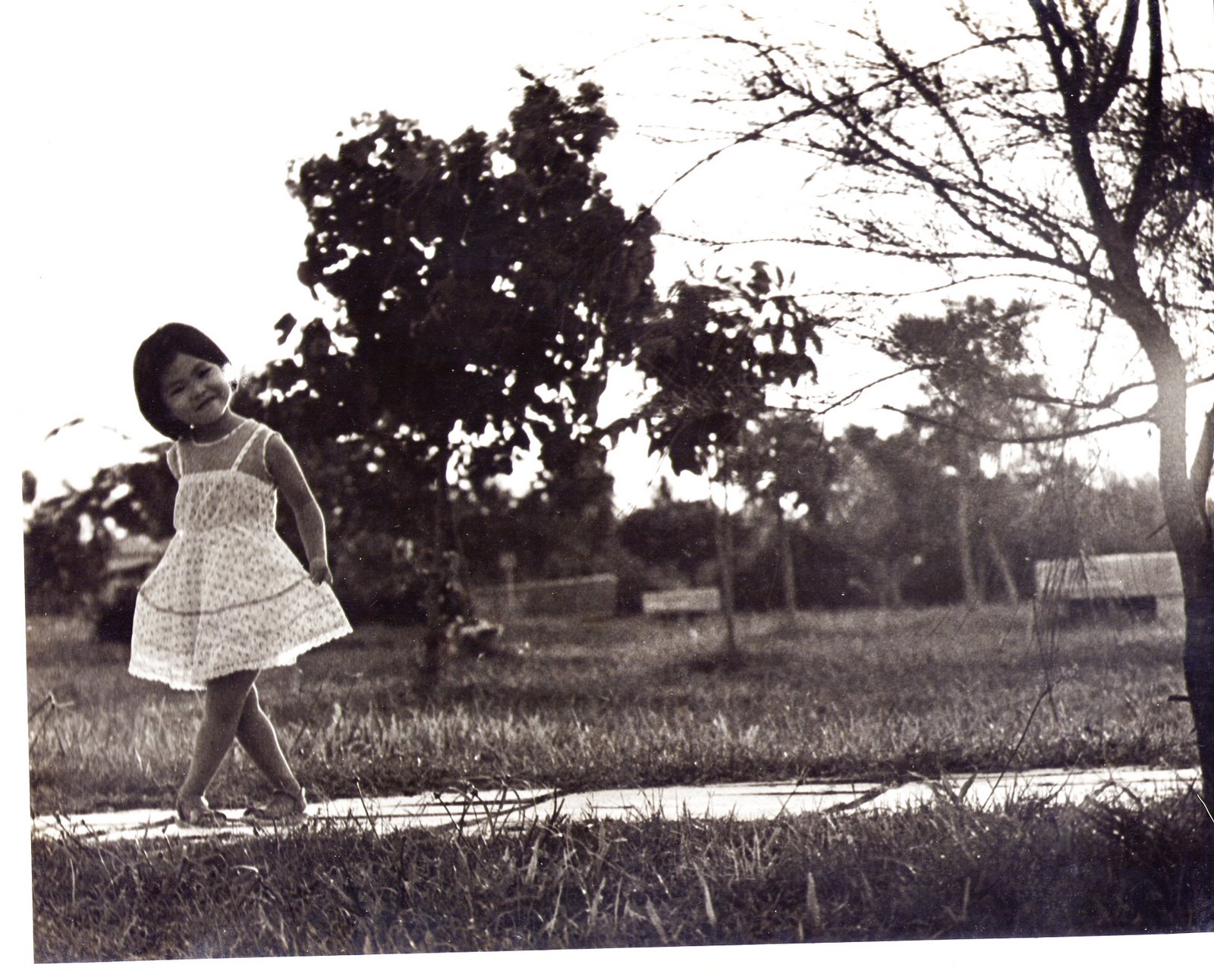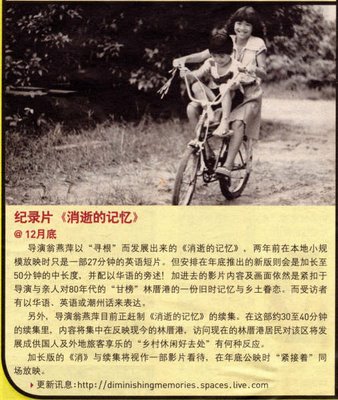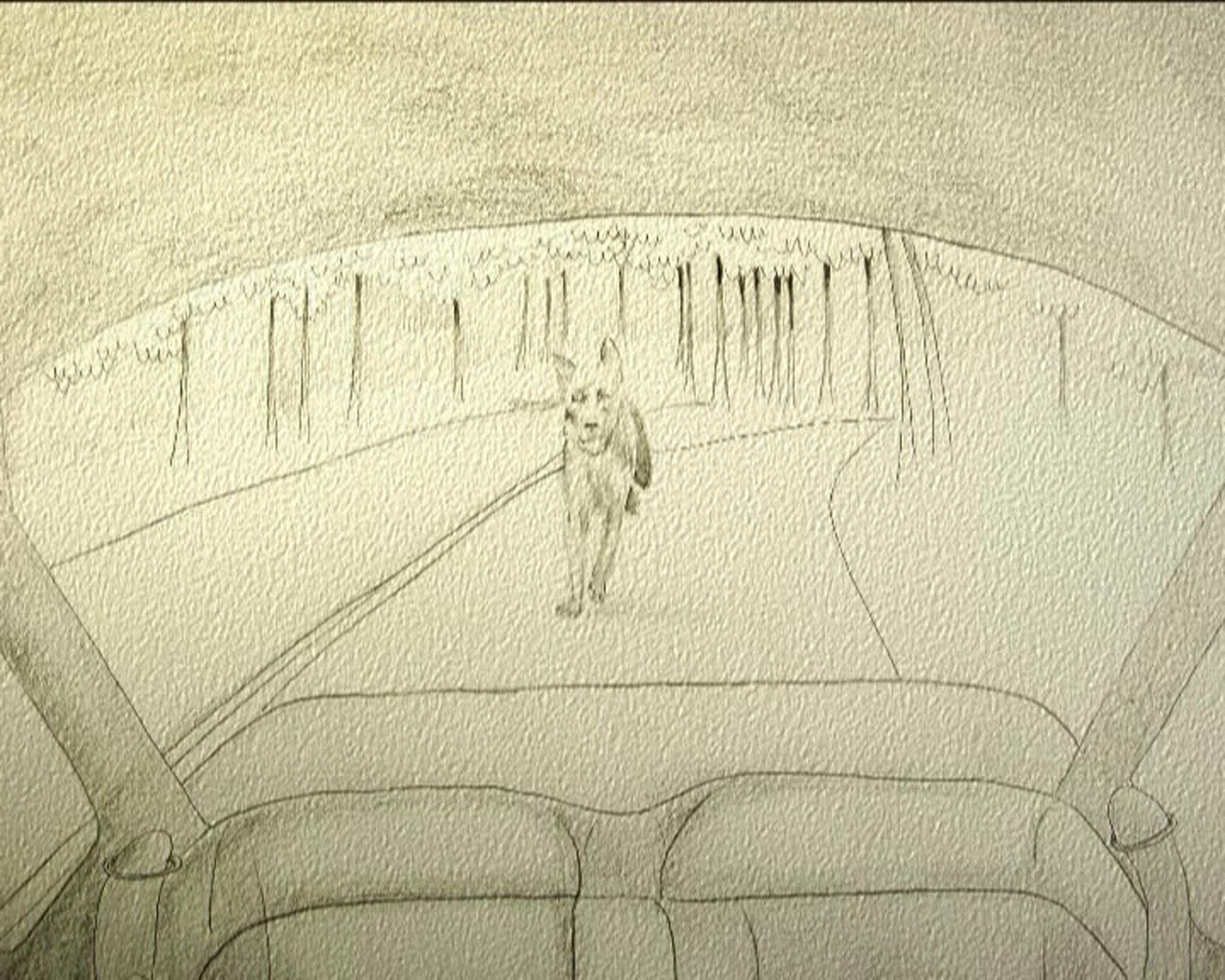
I took home with me 6 lives (or maybe more) from watching Diminishing Memories. I will always remember the endearingly helpless father, the fast-talking and level-headed mother, the jovial singlet-clad uncle, the Chinese Caligrapher, the laughing-Buddha face provision shop owner and of course, the earnest and brave Yee Peng, whose voiced stringed the different lives together.

A week ago, I watched a Simpson's spoof on indie documentary filmmaking in which Maggie Simpson tries making her first film and goes around exposing her family's ugly doings. She gets into Subdance and at the festival, the family members become the notorious talk of the town. Things are a little different in Dimishing Memories because Yee Peng actually interviews them (which already siphons off the uglier side of things). But the way the characters shared their views and lives so freely made me think that only Yee Peng could create this kind of screen honesty. Of course, for a first documentary, shooting a subject so close to her heart is a very smart move. But how many of us can actually make your parents feel comfortable in front of the camera, especially if they do not whole-heartedly approve of your filmmaking.

I had the opportunity to chat over dinner before I watched the documentary. While we spoke of the usual things filmmakers would talk or even grouse about, we also went beyond film and picked each other's life experience. Somehow, with her, I felt nothing was too low-brow to be talked about. The way she has told the story in DM emanates this spirit of hers as well. It was very `Kampung'. Though this has certain negative connotations in it, it is almost like the documentary cannot live without it. By `Kampung', I mean a few things - the scrapbook-style of presenting the story, the gushy and sometimes boorish narration, the closeness the characters felt towards Yee Peng who operated the camera and many more. Perhaps the film could get a better editor to cut the loose storytelling bits, but like fried lard in bak chor mee, the style redefined the film, because anyone could easily make a documentary about their family.
I cannot resist commenting on the characters and why they continue to live in my mind. Take the father as a start. He is wrinkled and all but had a face that grew on me. Alternating between saggy frowns and sudden grins, there was something quietly endearing about this man. I could tell he was probably an handsome and determined young man in his early years. His eyes are stern and focussed, even in his younger photos. It's no wonder he was such a prolific lorry-maker. But on the downside, he is not as shrewd as his wife. The relocation from Lim Chu Kang is remembered with sentiments of helplessness and even betrayal. In a sardonically funny moment when the daughter asks if he benefitted at all from the move, he said no, but there was definitely `victimisation' by the govt. And he said with a stifled laugh.
His wife, or rather Yee Peng's mother is one who will hold the family together in bad times. She is evidently strong and resolute. She talks fast and is very level-headed. Unlike dad's slightly dreamy and forlorn eyes, her expressions are always alert. But she is more complex than you think. Unlike her single-minded husband, she plays so many more roles. She is the manager of the kids, she is the gregarious party-organiser, she is sometimes an Ah Soh group leader (haha) but she will slow down and spare a thought and some honest emotions when the time calls for it. For instance, asking Yee Peng in front of the camera if she once felt neglected? On the whole, I feel she is Yee Peng's source of strength in the family and she would get a lot of guts from her mother. From her father, perhaps it is determination and ambition?

And then I will always remember how the chubby uncle who wore the singlet related how he knocked his elbows against the HDB bathroom wall when he might be thinking he was still bathing in Lim Chu Kang. Its seems to almost register the thought that we Singaporeans have been moulded into a generation of enclosed beings with clipped behaviour. Even his wife's warmth was so effortless and natural. She laughed as she commented how the camera had already started rolling even as Yee Peng stepped in. And the chunkiness of the meat filling in the Yong Tau Foo oozed with wholesome Kampung flavour as it sizzled in the cooking oil, just like the uncle's full-hearted laughter. The power of sentiment overrules so many things we perceive which is really the beauty of life. Just like how the wife felt so strongly about the taste of the water back in the Kampong. And its not just the wife, the old-fashioned singlet -clad husband wept buckets for leaving his Kampung.

Of course, there were other variants that formed that vivid family portrait that I remembered of DM. Some documentaries unintentionally exude a lot of romanticism in it and I think the mention of the Dog, like another family member was immensely sweet. Okay, maybe bittersweet. Related through the melancholic voice of Yee Peng's father, it was mentioned that he would make time to stop by the old abandoned house on his way to work just to take a look at the dogs everyday. Eventually, both dogs vanished. Which I think was the saddest part of the film because the documentary gave to them life and a subliminal kind of voice. And it was never heard, had to be imagined and died along with their Kampung.

A week ago, I watched a Simpson's spoof on indie documentary filmmaking in which Maggie Simpson tries making her first film and goes around exposing her family's ugly doings. She gets into Subdance and at the festival, the family members become the notorious talk of the town. Things are a little different in Dimishing Memories because Yee Peng actually interviews them (which already siphons off the uglier side of things). But the way the characters shared their views and lives so freely made me think that only Yee Peng could create this kind of screen honesty. Of course, for a first documentary, shooting a subject so close to her heart is a very smart move. But how many of us can actually make your parents feel comfortable in front of the camera, especially if they do not whole-heartedly approve of your filmmaking.

I had the opportunity to chat over dinner before I watched the documentary. While we spoke of the usual things filmmakers would talk or even grouse about, we also went beyond film and picked each other's life experience. Somehow, with her, I felt nothing was too low-brow to be talked about. The way she has told the story in DM emanates this spirit of hers as well. It was very `Kampung'. Though this has certain negative connotations in it, it is almost like the documentary cannot live without it. By `Kampung', I mean a few things - the scrapbook-style of presenting the story, the gushy and sometimes boorish narration, the closeness the characters felt towards Yee Peng who operated the camera and many more. Perhaps the film could get a better editor to cut the loose storytelling bits, but like fried lard in bak chor mee, the style redefined the film, because anyone could easily make a documentary about their family.
I cannot resist commenting on the characters and why they continue to live in my mind. Take the father as a start. He is wrinkled and all but had a face that grew on me. Alternating between saggy frowns and sudden grins, there was something quietly endearing about this man. I could tell he was probably an handsome and determined young man in his early years. His eyes are stern and focussed, even in his younger photos. It's no wonder he was such a prolific lorry-maker. But on the downside, he is not as shrewd as his wife. The relocation from Lim Chu Kang is remembered with sentiments of helplessness and even betrayal. In a sardonically funny moment when the daughter asks if he benefitted at all from the move, he said no, but there was definitely `victimisation' by the govt. And he said with a stifled laugh.
His wife, or rather Yee Peng's mother is one who will hold the family together in bad times. She is evidently strong and resolute. She talks fast and is very level-headed. Unlike dad's slightly dreamy and forlorn eyes, her expressions are always alert. But she is more complex than you think. Unlike her single-minded husband, she plays so many more roles. She is the manager of the kids, she is the gregarious party-organiser, she is sometimes an Ah Soh group leader (haha) but she will slow down and spare a thought and some honest emotions when the time calls for it. For instance, asking Yee Peng in front of the camera if she once felt neglected? On the whole, I feel she is Yee Peng's source of strength in the family and she would get a lot of guts from her mother. From her father, perhaps it is determination and ambition?

And then I will always remember how the chubby uncle who wore the singlet related how he knocked his elbows against the HDB bathroom wall when he might be thinking he was still bathing in Lim Chu Kang. Its seems to almost register the thought that we Singaporeans have been moulded into a generation of enclosed beings with clipped behaviour. Even his wife's warmth was so effortless and natural. She laughed as she commented how the camera had already started rolling even as Yee Peng stepped in. And the chunkiness of the meat filling in the Yong Tau Foo oozed with wholesome Kampung flavour as it sizzled in the cooking oil, just like the uncle's full-hearted laughter. The power of sentiment overrules so many things we perceive which is really the beauty of life. Just like how the wife felt so strongly about the taste of the water back in the Kampong. And its not just the wife, the old-fashioned singlet -clad husband wept buckets for leaving his Kampung.

Of course, there were other variants that formed that vivid family portrait that I remembered of DM. Some documentaries unintentionally exude a lot of romanticism in it and I think the mention of the Dog, like another family member was immensely sweet. Okay, maybe bittersweet. Related through the melancholic voice of Yee Peng's father, it was mentioned that he would make time to stop by the old abandoned house on his way to work just to take a look at the dogs everyday. Eventually, both dogs vanished. Which I think was the saddest part of the film because the documentary gave to them life and a subliminal kind of voice. And it was never heard, had to be imagined and died along with their Kampung.